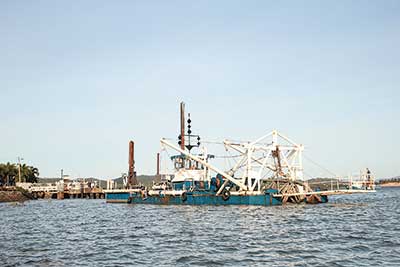After more than 10 years of lobbying by Cook Shire Council and local and regional stakeholders, dredging of the Endeavour River swing basin and leads is expected to be completed by mid-September.
Last dredged in 1999, the Endeavour River mouth had since become so silted that the Cooktown harbour was no longer officially recognised as a Port of Refuge during a cyclone, Cook Shire Mayor Peter Scott said.
“Our status as a Port of Refuge is no longer formally accepted.
“The primary marine insurer, Club Marine, will not insure boats here as Cooktown isn’t a recognised safe harbour, and cruise ships and commercial fishing vessels have cancelled Cooktown from their itinerary, or suffered restrictions.”
By early September more than 50,000 cubic metres of silt was expected to be dredged from the river, with the majority used in the Cooktown waterfront reclamation.
“Any residual dredge will be placed at sea, well north of the river mouth at a previously approved site.
“Extensive sampling of the spoil shows that it is very clean and we have been in discussion with the Environmental Protection Agency about supplying this sand for the reconstitution of Raine Island, a critical turtle hatchery on the Great Barrier Reef, which is being eroded by the rising sea level.”
The dredging of the channel and positioning of the reclamation rockwall is expected to narrow the channel and tidal flow area to increase the natural sluicing effect, with the aim of reducing the need for ongoing maintenance dredging in the area.
Cr Scott said any acid sulphate reactions from the spoil’s exposure to air would be counteracted by the inclusion of natural lime, and there would be no environmental damage to the riverbed.
The Department of Transport and Main Roads undertook the $1.5 million project.

















